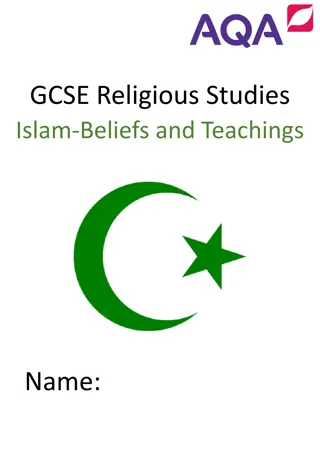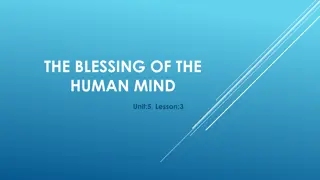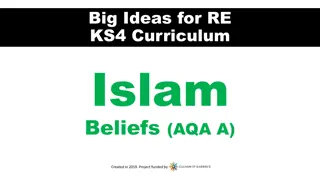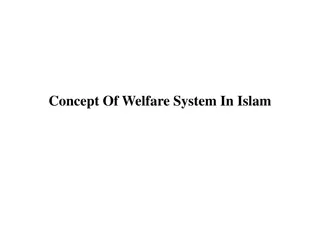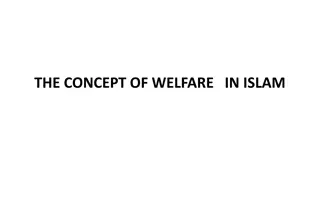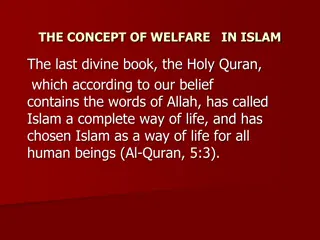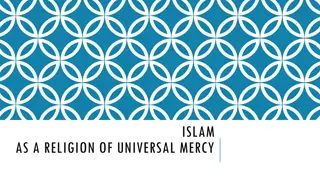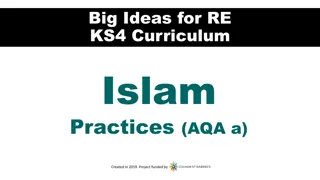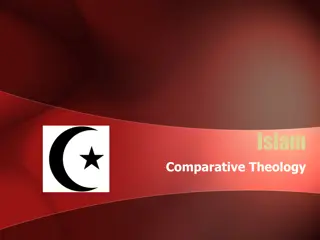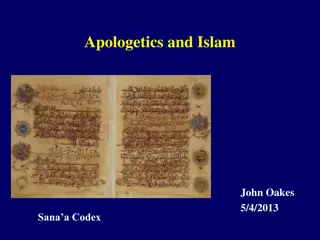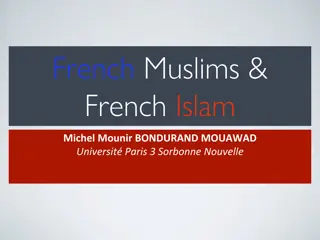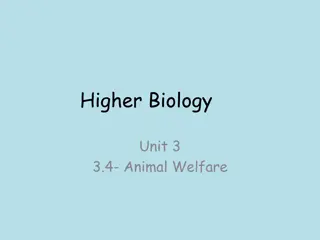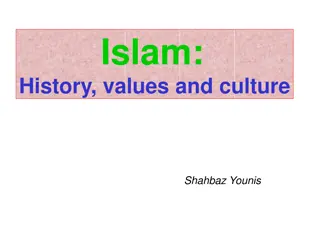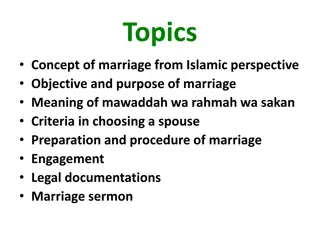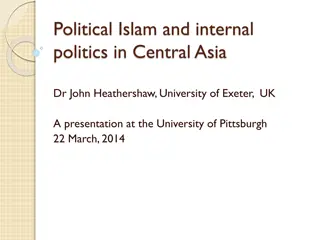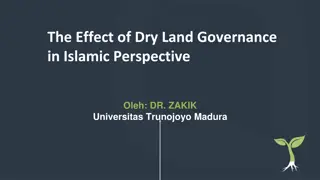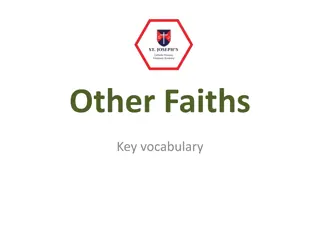Welfare in Islam: A Comprehensive Perspective
The concept of welfare in Islam is deeply rooted in the teachings of the Holy Quran and the practices of Prophet Muhammad and his caliphs. Islam encompasses all aspects of life - social, political, economic, and personal - under its umbrella, emphasizing the importance of unity between temporal and spiritual authorities. The Islamic state pioneered welfare services, laying the foundations of the first welfare state in history. Islam views life holistically and promotes an organized society governed by its tenets for the well-being of all individuals.
Download Presentation

Please find below an Image/Link to download the presentation.
The content on the website is provided AS IS for your information and personal use only. It may not be sold, licensed, or shared on other websites without obtaining consent from the author. Download presentation by click this link. If you encounter any issues during the download, it is possible that the publisher has removed the file from their server.
E N D
Presentation Transcript
THE CONCEPT OF WELFARE IN ISLAM The last divine book, the holy Quran, which according to our belief contains the words of Allah, has called Islam a complete way of life, and has chosen Islam as a way of life for all human beings (al-Quran, 5:3).
THE MEANING OF ISLAM Islam is Arabic word which means submission and obedience to Allah. When Islam is termed as complete way of life, it means it.: no aspect of life social , political, economic or personal, is out of the sphere of Islam.
The Holy prophet Muhammad (PBUH) and his four caliphs (Khulafa-e-Rashedeen) made it an authority for the rest of time and world. They actually united the temporal and spiritual authorities and practiced them in a human society and which in the first instance remained in practice for a century in one go. (till the period of Omar bin Abdul Aziz 717-820 AD or 99-101 AH).
During this period , even though the caliphate (Khilafat) was converted into dynastic kingship (Mulukiat), the basic structure of the Islamic state welfare services remained unaffected despite the fact that the public exchequer was in the hands of the kings or the so-called caliphs. It was the Islamic state and Government which laid the foundations of the first welfare State in the human history on this planet.
THE SACRED AND THE SECULAR Today, things and actions are divided into sacred and the secular and are two different things. One is private and the other is social. Islam recognize this world as a source of salvation and prosperity in the eternal life in the world hereafter. As a Muslim we believe in the fundamental that there is life after death and every one will be accountable for his/ her deeds and/or misdeeds.
Islam views life as a consistent whole and all the aspects of the human life whether economic, social or political, are considered as interdependent. ;there is no room for any aspect of life to be separated in secular and sacred. Every socio-economic and political system is goal oriented and inconceivable with out any organized community / society governed in accordance with the tenets of that system. Similarly Islam as a way of life is goal oriented and needs an organized society for its governance in accordance with its own tenets
THE ISLAMIC APPROACH TO SOCIAL WELFARE Catering to the welfare of the people and relieving them of hardships is a basic objective of the Islamic State, and the Islamic concept of welfare encompasses all the welfare services which are known in the west as social services - education, health, rural development, agriculture, public health, sanitation, income maintenance, child welfare, law and order and any other aspect of material and social well-being.
The Islamic welfare model is much broader in the sense that it considers man not only in need of material needs but also in spiritual needs and Islam does take notice of that as well. Man is made up of matter (clay)[1] and Islam wants his material well-being. But that matter is also infused with a soul and matter and soul comprise an indivisible human being. Man s material and spiritual needs are therefore, necessary and indivisible. [1]Al-Quran, (Al-Hajr) 15: 26.
God almighty has created sources for meeting the material needs on and above the earth and made them subject to the humans[1]. All these resources on, and above or below the earth are for human beings and not for any particular privileged group/ class or country; and it can therefore, also be inferred that they are meant for general welfare the eradication of poverty and fulfilling the basic material needs of all humans. [1]Al-Quran, Al-Baqara: 2.29. see also Al-Quran, Al-Luqman, 31;20, Al-Ibrahim 14:32.
ISLAMIC PHILOSOPHY OF WELFARE The basic philosophy of Islamic welfare system is that the Islamic state is not only to provide charity and basic needs to the citizens but a system, which removes all hindrances in the development of personality. Hence, in an Islamic state the ultimate aim is to attain Saadah blessings of Allah, the Great, -a man s best self and the attainment of perfection.
A-GHAZALIAND ISLAMIC WELFARE Al-Ghazali has defined the objectives of the Islamic politico-Legal system as the promotion of public welfare, and according to him public welfare refers to safeguarding faith, intellect, life, property and prosperity[1]. [1] Abdul HamidAl-Ghazali, Al-Musatafa Vol.-I.. Al-Maktaba Al- Tajiran Kurba, Cairo,pp.130-40
AL-QAYYEMAND WELFARE Ibn-Al-Qayyem emphasizes that the basis of Islamic Sharia is wisdom and welfare of the people in this world as well as in the world hereafter. He enumerates the elements of public welfare as complete justice, mercy, welfare and wisdom[1]. Hence in contrast to the welfare system of western democracies, the Islamic welfare state takes care of the spiritual as well as material welfare. [1] Ibn-AlQayyemAl_jawzzia, Ilam-ul-Muaqi in KhurshedAhmad (ed), 1990. Studies in Islamic Economics. Islamic Foundation UK. P.149
Hence, in an Islamic State all the organizations and institutions should reflect the characteristic of merciful blessings and cater for the welfare of all people. Alongside material prosperity the Quranic commands emphasize the spiritual aspect of humanity, for Islam helps a man both in this world and in the world hereafter .
THE FIRST WELFARE STATE when the persecution and atrocities of Makkan s increased beyond limits, the holy prophet Muhammad (p.b.u.h) was asked by Allah to migrate to Madina, in the year 622 ad\ CE after thirteen years of preaching and calling to the way of Allah.
With migration to Madina, a new era of Islamic history started. The Muslim got a practical chance to implement the divine teachings and way of life under the supervision and guidance of the holy prophet Muhammad (pbuh).
Political scientists say that any legal system with out political sovereignty is meaningless, similarly laying the foundations of a state in Madina was necessary for the new creed as a complete way of life and the holy prophet laid the foundations of an Islamic state at Madina, was the first welfare state in the history of man kind,
run by human beings, the vice gerent of God on the earth, under the divine socio-political and economic directives. This was the first practice of an Islamic state in the city of Madina and where the holy prophet had united the temporal and spiritual authorities in his person under divine commands.
This initial experiment slowly expanded to the surrounding areas, to Makkah after its conquest and then the nearby tribes. Within a period of a decade, after the death of the holy prophet this state expanded to the entire Mesopotamia and the big empire Iran, conquered by the Muslim armies.
The personality of the holy prophet (pbuh) and the way he brought up his companions, brought a total change in their lives, personalities, economic and political ideals and every other aspect of social life. This change had far-reaching impacts on furthering the expansion of the state.
After the death of the holy prophet (PBUH) his close companion and Aide Abu-Bakr Siddique (RA), was selected as the Caliph of the Muslims. This was period of internal and external turmoil and there were many challenges to the
nascent state of Islam but he managed not only to quell the internal instabilities but also the external threats and maintained the Islamic state and succeeded in its expansion as well.
Abu-Bakr (RA) was followed by Omar bin Al-Khitab as the second Caliph. He was born in Makkah in the year 586 CE. It was his Caliphate when the Islamic state was transformed into a world power and where he consolidated the foundations of the welfare state and
provided the citizens with services and facilities 1500 years ago, which are , today, considered as the characteristic of a welfare state, in modern times particularly in the west.
His social policies were the same as of the present day UK, with a few exceptions as those of deduction for social insurance and the interest based economy. He laid the administrative foundations of the govt. and an independent judiciary.
THE STRUCTURE AND FUNCTIONS OF THE FIRST WELFARE STATE 1. Judiciary Before the Islamic era, in the entire Arabia there was no centralized government, and Arabs lived a tribal life. Tribe was every thing for them and all the basic necessities of life were met at the tribe level. This lead us to believe that there was no concept of any judiciary. With the emigration of Muslims to Madina, and the establishment of the state introduced the concept of judiciary.
Being a city state, this concept was limited and Mosque was the center of all the worldly affairs as well. With the passage of time the concept broadened as the Islamic state expanded. In the period of the first Caliph, the same pattern continued at Madina where there was an established Islamic government
With the selection of Omer as second Caliph, a man of extra ordinary administrative capabilities, and potentialities, the departmentalization of the government started and the first thing he did, was the
establishment of an independent judiciary and its separation from the executive. He appointed judges (qadhis) who used to decide the criminal and civil cases in the light of the Islamic jurisprudence and legal system.
These judges were appointed at the center as well as every provincial headquarters throughout the Islamic state. Before this, the governor of every province was the judge, the chief police officer, and the chief executive or held all the administrative as w ell as judicial powers.
Omer did not like this concentration of powers in a hand and separated the judiciary from the executive. He appointed judges of immense repute both honesty wise and knowledge wise. These judges were normally from well- to- do and scholastic background so that they could not be easily enticed for any favorable judgment. He fixed high salaries for these judges[1]. [1] Maulana Shibli Naumani, 1927, Al-Farooq. Delhi: Naz Publishing house,p.47-51.
2 2. ESTABLISHMENT OF SHURA OR PARLIAMENT The concept of the establishment of the Shura or parliament of selected people, based on knowledge and piety of the selectees was introduced by the holy Prophet (pbuh). The establishment of a Shura is obligatory for an Islamic polity and this Shura does not mean the parliaments in the contemporary
Muslim world as recommendatory bodies and which are the meeting clubs of the aristocrats and the most corrupt political practitioners, to pursue their vested interests but it really meant a Shura and their say had a weight in the political decisions.
Even at the period of the prophet (pbuh) , on the occasion of the battle of Uhd, when the holy prophet convened the Shura or general meeting of the Madina people and asked their opinion about the venue of the battle, majority of them wanted to face the Makkans at Uhd instead of having a passive defense at Madina albeit the prophet himself was of the later view.
Omer the second Caliph expanded the Shura and gave it a permanent status. For ordinary issues and day to day matters the learned people and those close to the holy prophet were consulted but no political or national issue was under taken without the decision of the Shura. Meetings of the Shura were used to hold in at
mosque at Madina and every member was free to express himself in the best interest of the state. Decisions were made with a majority opinion principle. The appointment of Governors, ambassadors, judges and other high officials was made after consultation with the Shura.
3. 3. ACCOUNTABILITY OF HIGH -UPS Omer was known as Farooq-e-Azam which means a person who makes difference between right and wrong. He was very stern with regard to justice. He had announced that the high officials of the Islamic state are not appointed to harass, terrorize and tyrannize the public but are appointed to teach the religion and the methods of the prophet (pbuh). He ordered that whosoever has any complaint against any of the officials should come and report to him and he will take care of their rights.
He had ordered that all the Governors of the Islamic state be present on the occasion of Hajj so that if there is any complaint against them, be decided. On one such occasion a man reported that he had been tortured by the Governor of Egypt for no fault of him and he proved it. Omer immediately penalized the Governor and asked the man to take his revenge from him openly and that happened before thousands of people at Makkah.
4.SOCIAL SECURITY PROGRAMEMS During the early days of the Islamic state, the revenue resources were scarce and meager. Even then whatever came to the state was distributed among the needy at the same time. There was no concept of accumulating the wealth if people needed that. During the period of the first Caliph, a building was specified for the purpose where state revenue were collected and kept and then distributed
During this period the amount so distributed among the needy residents of Madina, was 20 pieces to maximum. During the second Caliph, Omer Farooq, the economic resources of the Islamic state tremendously increased.
It is said that when Bahrain was conquered, the treasury of that state came as booty laden on 90 camels. The treasury was consisting of gold, silver and jewels and other precious things. As a result of that the economic conditions of the Islamic sate improved a lot.
In order to provide maximum relief to the needy citizens out of this wealth, Omer convened the Shura and asked the opinion. The Shura decided that from the revenue the entire population of the Islamic state who needed it, be provided with financial assistance and it was the first social assistance programme in the history, on a national level.
The aristocracy in Madina was of the view that they should be given preference and were not in favaour of help to ordinary Muslims equal to them. A formula was devised that those who were the first converts, were given priority.
The second priority was given to the relationship with the holy prophet (pbuh) and the third category was of ordinary citizens irrespective of their religious attachment.
Omer Farooq established the public exchequer and appointed responsible people of good reputes in-charge of the exchequer who kept the accounts and this was the first Treasury and Finance Department of the Islamic state. . [1] William Muir, 1924, The Caliphate: its Rise, decline and Fall, Edinburgh: John Grant, 31 George IV Bridge, p.148.
Every person whether adult or child, male or female, Muslim or Non-Muslim were given the assistance in cash on an annual basis and minimum rate was 200 pieces (Dinar) for a child which increased with the passage of time[1].
Similarly, a social security programme was founded by him and every aged, disabled, and jobless man, women and child was given cash benefits without any contribution by them. For himself, he lived a very simple life and lived as ascetic life to the extent of harshness [2]. [2] The New Encyclopedia Britannica, 1990,Vol-12.p.119
5. CONSTRUCTION OF INNS, GUEST HOUSES FOR WAY- FARERS AND TOURISTS;- In the period of Omer Farooq, guest s houses/ inns were constructed along the main road sides and in the capital cities and towns where wayfarers and tourists and traders stayed free of cost. They were provided with food, shelter and medical facilities there. Many times he used to visit the main inn in Madina and met the wayfarers and traders and served them himself.
6. PROTECTION TO THE UNPROTECTED/ ORPHANS As already mentioned, every child was granted assistance and with passage of time the amount increased. Omer had ordered that protection should be given to those who are unprotected and who have no guardian/ ward etc.
He had ordered that any such child who is left by mother on the road side or other places, the state will be responsible for his brought up and maintenance.
though there were no baby homes and day care centers like the present day but the local people or those who were interested in adapting such children, were given much incentives to adopt them and they were paid 100 Dinars as maintenance allowance for every child which increased with their age[1]. [1] Maulana Shibli Naumani, Op. Cit.






